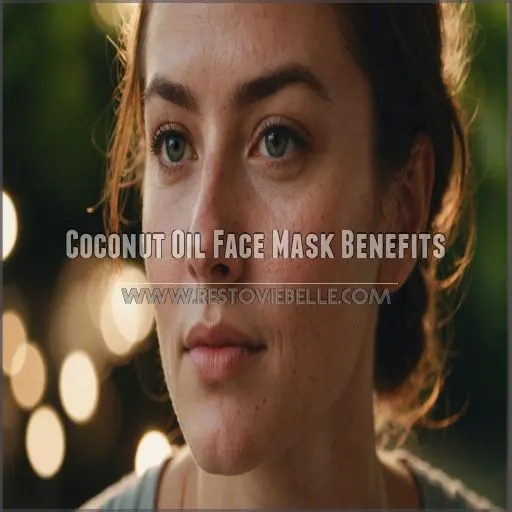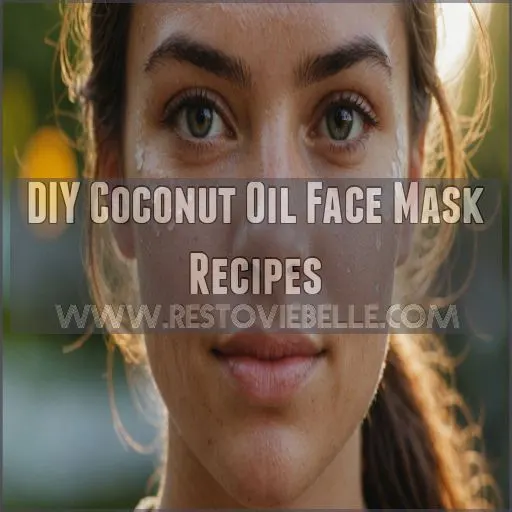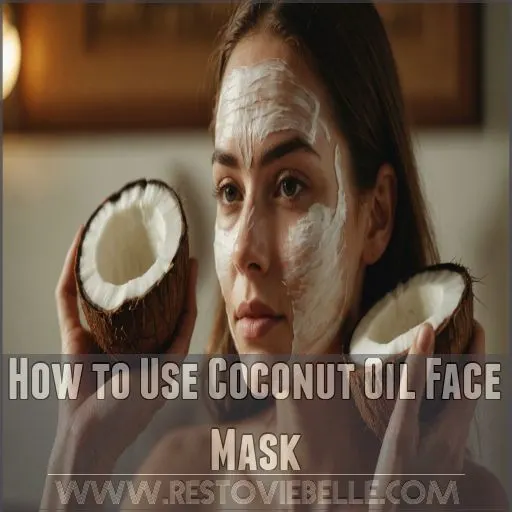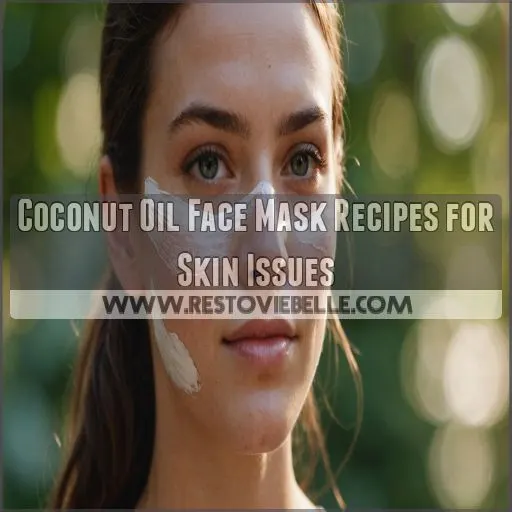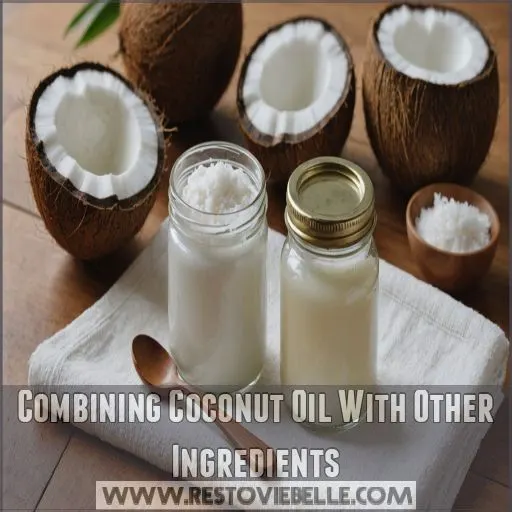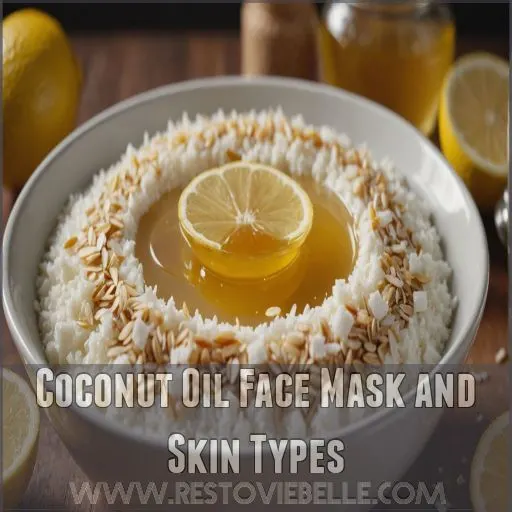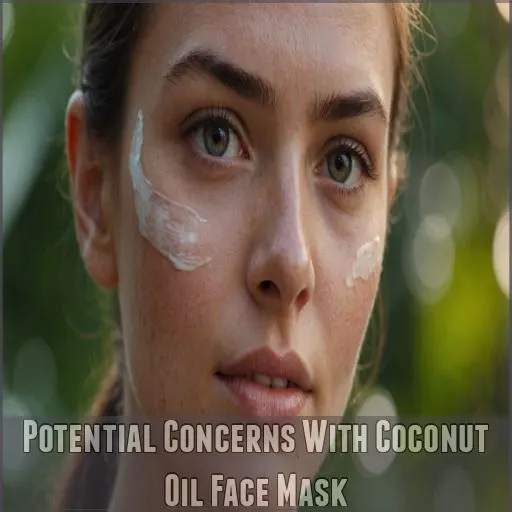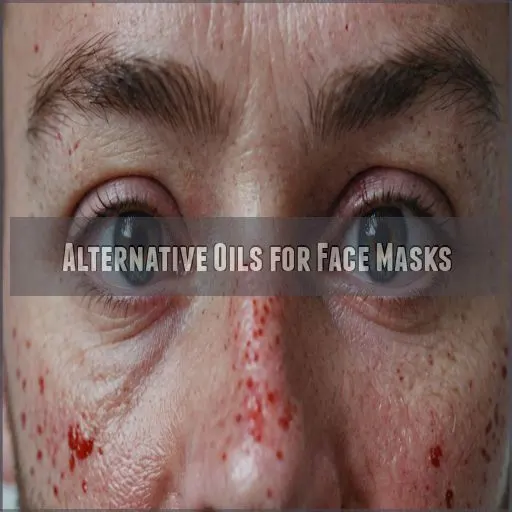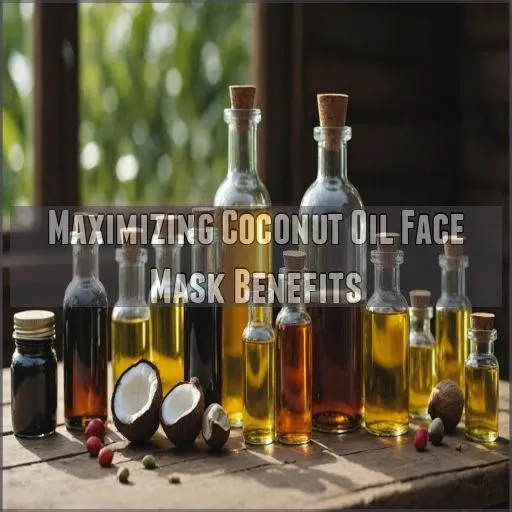This site is supported by our readers. We may earn a commission, at no cost to you, if you purchase through links.
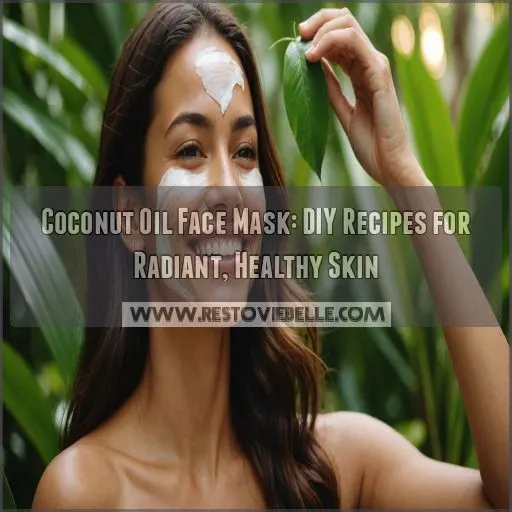 Transform your skincare routine with a coconut oil face mask! Imagine a mini tropical getaway for your skin—it’s like a beach vacation minus the sand.
Transform your skincare routine with a coconut oil face mask! Imagine a mini tropical getaway for your skin—it’s like a beach vacation minus the sand.
Coconut oil deeply nourishes, locking in moisture for supple, smooth skin. It gently cleanses and fights bacteria, while its anti-inflammatory powers soothe any redness.
DIY options are endless: mix yogurt for brightening magic or avocado for a hydration boost. Just apply, wait 15 minutes, and rinse off to reveal a glowing complexion.
But remember, it’s not all sunshine; coconut oil can clog pores for some skin types. Ready to find glowing skin secrets? Keep reading!
Table Of Contents
- Key Takeaways
- Coconut Oil Face Mask Benefits
- DIY Coconut Oil Face Mask Recipes
- How to Use Coconut Oil Face Mask
- Coconut Oil Face Mask Recipes for Skin Issues
- Choosing the Right Coconut Oil for Face Mask
- Combining Coconut Oil With Other Ingredients
- Coconut Oil Face Mask and Skin Types
- Potential Concerns With Coconut Oil Face Mask
- Alternative Oils for Face Masks
- Maximizing Coconut Oil Face Mask Benefits
- Frequently Asked Questions (FAQs)
- Can you use coconut oil in a face mask?
- Is coconut oil good for hair and skin?
- How do you make a coconut oil face mask?
- Does coconut oil & honey face mask work?
- Is coconut oil good for a face mask?
- Is it good to apply coconut oil on face?
- What to mix with coconut oil for your face?
- How do you make a coconut oil mask?
- Can coconut oil cause skin allergies?
- Is coconut oil safe for eczema-prone skin?
- Does coconut oil interact with hair products?
- How does coconut oil temperature affect texture?
- Is coconut oil effective for makeup removal?
- Conclusion
Key Takeaways
- Coconut oil is a skincare powerhouse, working wonders for your complexion by deeply nourishing, locking in moisture, and fighting bacteria and inflammation. It’s like a tropical getaway for your skin!
- Whip up easy DIY coconut oil face masks to tackle common skin issues like dryness, uneven skin tone, and acne. It’s a spa day at home – no fancy robe needed.
- When choosing coconut oil, always go for the organic option – it’s your skin’s best friend, moisturizing deeply and supporting your hair too. However, be mindful if you have oily or sensitive skin.
- To maximize the benefits, make coconut oil face masks a regular part of your routine, pair them with gentle exfoliation, and don’t forget sun protection – your glowing complexion awaits.
Coconut Oil Face Mask Benefits
Coconut oil is a skincare powerhouse, working wonders for your complexion.
From softening dry skin to fighting acne, this versatile oil delivers a host of benefits that’ll leave your face looking and feeling its best.
Conditions and Softens Dry Skin
Dry skin can feel like the Sahara Desert sometimes, right? Coconut oil swoops in to save the day, offering a soothing oasis for your parched skin. It helps lock in moisture and smooth those rough patches.
Here’s how:
- Nourishes deeply – penetrates your skin effortlessly .
- Locks in moisture – acts like a protective shield .
- Leaves skin soft and supple – goodbye, crocodile skin! .
Cleanses Skin
You’ve softened your skin; now let’s revamp your skin cleansing routine!
Coconut oil swoops in like a superhero for natural skin care, particularly in treating dry skin under beard
. It gently wipes away makeup and grime while maintaining your skin barrier and improving skin texture and health.
Just a small amount offers effective DIY skin care, cleansing pores like a pro without drying. Forget harsh facial scrubs—embrace the nourishing power of coconut oil!
It is a great way to improve skin texture and health.
Reduces Inflammation
Speaking of inflammation, coconut oil’s anti-inflammatory properties can soothe skin irritation and bring relief to issues like eczema and sunburn.
Imagine it as a gentle hug for your skin, calming the redness and relieving discomfort.
It’s not a one-size-fits-all solution, but it might just be the sidekick your skin needs on its healing journey.
Treats Acne
Battling acne can feel like fighting a relentless dragon. Coconut oil’s lauric acid swoops in like a knight, targeting pesky Propionibacterium acnes with its antimicrobial powers .
But beware, friends with oily skin—coconut oil might clog pores and worsen acne.
Try adding:
- Activated charcoal for deep cleansing
- Tea tree for added bacteria-fighting
- Lactic acid for gentle exfoliation
Anti-aging
Looking to keep those wrinkles at bay? Coconut oil face masks might be your skin’s new best friend. Boost skin elasticity and collagen production while reducing fine lines with this natural wonder. Coconut oil’s moisturizing properties, similar to its benefits for curly hair care, help smooth wrinkles, leaving your skin feeling youthful and vibrant
. Try mixing it with avocado for an extra collagen boost!
| Mask Ingredient | Benefit | Emotion Evoked |
|---|---|---|
| Coconut Oil | Moisturizes | Comfort |
| Avocado | Boosts Collagen | Youthfulness |
| Nutmeg | Exfoliates | Freshness |
| Yogurt | Brightens | Radiance |
| Honey | Soothes | Calm |
Ready to explore the wonders of DIY mask ideas? Your skin’s adventure awaits!
DIY Coconut Oil Face Mask Recipes
Ready to treat yourself to a spa day at home?
Grab your trusty jar of coconut oil because these simple DIY face mask recipes will leave your skin looking bright, hydrated, and oh-so-radiant!
Brighten Skin With Yogurt & Coconut Oil
Whip up a simple yet effective yogurt and coconut oil face mask to brighten your complexion and achieve a natural glow.
The lactic acid in yogurt gently exfoliates while coconut oil’s nourishing properties hydrate and soften skin.
Follow these 4 easy steps for a luminous, radiant look:
- Mix 1 tbsp coconut oil and 2 tbsp plain yogurt.
- Apply the mask to clean skin, avoiding the eye area.
- Let it sit for 15 minutes before rinsing with warm water.
- Pat dry and follow with your favorite moisturizer.
Hydrate Dry Skin With Avocado & Coconut Oil
Ready to boost your skin’s glow?
Mix avocado, with its rich vitamin E and soothing fats, and coconut oil, known for skin barrier repair.
Blend a ripe avocado with a tablespoon of coconut oil for a rich, hydrating mask.
Apply evenly, let it sit for 15 minutes, rinse, and bask in your newfound radiance!
Exfoliate With Oatmeal & Coconut Oil
Transform your skincare routine with an oatmeal and coconut oil face mask!
Oatmeal gently exfoliates while coconut oil hydrates, leaving your skin soft and glowing.
Just blend finely ground oatmeal with a bit of extra virgin, cold-pressed coconut oil.
It’s a simple DIY way to bolster your skin barrier, and your face will thank you for it! .
Even Out Skin Tone With Turmeric & Coconut Oil
Imagine your skin glowing like a sun-kissed beach. Use turmeric and coconut oil to even out your skin tone.
- Mix 1 teaspoon of turmeric with 2 teaspoons of coconut oil.
- Apply the golden paste to your face.
- Leave it on for 15 minutes.
- Rinse well.
You’ll see those pesky dark spots fade!
Cleanse With Honey & Coconut Oil
Want to treat your skin while boosting its barrier health?
Let your skin soak up the benefits with this simple DIY mask using honey and coconut oil.
Honey’s moisturizing touch and coconut oil’s ability to improve skin barrier integrity make this combo irresistible.
Just mix, apply, and enjoy the glow! It’s like a spa day at home .
How to Use Coconut Oil Face Mask
Using a coconut oil face mask is like giving your skin a nutritious smoothie—it’s easy, quick, and leaves you glowing!
Just prep your skin, slather on the mask, and rinse off to reveal a radiant complexion that’ll have you feeling like you’ve just been pampered at a spa!
It will have you feeling like you’ve just been pampered at a spa!
Preparing the Skin
Before using a coconut oil face mask, prepping your skin is as simple as pie. Start by cleansing to remove the day’s grime—it’s like a fresh canvas for your art.
Gently exfoliate to make sure that nutrients can penetrate.
A toner can refine your skin, while moisturizing maintains hydration, enhancing your skin barrier and preparing even sensitive skin for pampering.
Applying the Mask
Applying the coconut oil face mask is a breeze!
Gently massage the nourishing blend onto your freshly cleansed skin, focusing on areas that need a little extra TLC.
Smooth it on with your fingertips or use a:
- Soft, clean makeup brush for even coverage
- Facial cleansing brush for a deeper clean
- Reusable cotton rounds for targeted application
- Silicone face mask applicator for mess-free fun
Leaving the Mask On
You might wonder how long to let your coconut oil face mask work magic.
Well, 15-20 minutes is the best amount of time for the best results. Too long can leave oily skin feeling greasy, while not enough won’t allow for skin barrier regeneration. Relate it to cooking—give it just the right simmer to plump your skin!
| Time (mins) | Skin Type | Result |
|---|---|---|
| 15-20 | Oily | Balanced oils |
| 15-20 | Dry | Deep moisture |
| 15-20 | Sensitive | Calming effect |
| 15-20 | Combination | Even skin plumping |
Rinsing and Moisturizing
Once your coconut oil mask has done its magic, grab a washcloth soaked in warm water to gently remove it.
This helps skin hydration by minimizing skin barrier disturbance.
Follow up with a lightweight moisturizer or one containing alpha-hydroxy acids for enhanced skin barrier recovery. Embrace the glowing, fresh look your skin craves! (Source)
Coconut Oil Face Mask Recipes for Skin Issues
Ready to give your skin some TLC?
Whip up these easy coconut oil face masks to tackle common skin issues like dryness and uneven skin tone with a smile.
It’s like a spa day but without the fancy robe!
Coconut Oil and Oatmeal Mask for Soothing Skin
When life’s rough and your skin feels like sandpaper, an oatmeal mask benefits by soothing dry skin with its calming embrace.
Combine the magic of coconut oil and oatmeal in a DIY mask for sensitive skin types, using a gentle and effective cleanser like a best foaming face wash
.
This face mask eases irritation, creating a spa moment at home.
Who knew oatmeal could be more than breakfast?
Lemon, Coconut Oil, and Yogurt Face Mask for Brightening
Brightening your skin is a breeze with a DIY mask combining coconut oil, yogurt, and lemon juice. This mask’s trifecta helps even skin tone and adds a glow!
To whip it up, just:
- Mix 1 tbsp coconut oil and 2 tbsp yogurt.
- Add a splash of lemon juice.
- Apply, leave 15 minutes.
- Rinse off, enjoy!
Avocado and Coconut Oil Face Mask for Nourishing
For a nourishing and lush DIY face mask, combine the benefits of avocado and coconut oil. This duo is your skin’s best friend—hydrating, soothing, and simply divine.
Smash an avocado, mix in a teaspoon of coconut oil, and voilà!
Apply this delightful mix, let it sit for 15 minutes, then rinse. Your skin will thank you, it’s a truly divine treat.
Baking Soda and Coconut Oil Mask for Deep Cleansing
You’ll love how a simple baking soda and coconut oil mask can deeply cleanse your skin.
This dynamic duo helps unclog pores, banish blackheads, and leave your complexion feeling refreshed.
Just mix the ingredients, apply, and let the natural exfoliants get to work.
Your skin will thank you for this weekly treat!
Choosing the Right Coconut Oil for Face Mask
Choosing the right coconut oil for your face mask can seem like picking a star from the sky, but don’t worry—it’s easier than finding matching socks.
Always go for organic coconut oil for the best skin benefits, and your face will thank you with a glow that’s more radiant than your favorite lamp!
1. Organic Coconut Oil for Skin and Hair
Choose organic coconut oil for its versatile magic on skin and hair—it’s like nature’s little multitasker!
Love how it:
- Moisturizes deeply, leaving skin velvety smooth.
- Acts as a natural hair conditioner for luscious locks.
- Provides a soothing touch for irritated skin and helps fight bacteria that cause breakouts, reduce inflammation and redness.
- Comes with organic certification for purity assurance, ensuring a chemical-free product that’s gentle on your skin and the planet.
Explore coconut oil’s wonders and transform your beauty routine effortlessly.
2. Organic Coconut Oil For Cooking And More
Cooking with coconut oil opens up a world of flavor and health benefits. This golden oil, rich in lauric acid, adds a tropical twist to your meals while supporting heart health.
Imagine sautéing veggies or baking bread, all with an ethical touch!
Here’s a handy table to guide your culinary adventures:
| Coconut Oil Uses | Cooking Tips | Storage Tips |
|---|---|---|
| Baking | Use in cookies | Keep airtight |
| Sautéing | Ideal for veggies | Room temperature |
| Frying | High smoke point | Avoid sunlight |
| Salad dressing | Mix with vinegar | No refrigeration |
Combining Coconut Oil With Other Ingredients
You can elevate your skincare routine by blending coconut oil with simple pantry ingredients for amazing results.
Whether it’s mixing with honey for extra moisture or green tea for an antioxidant boost, there’s a recipe that’s equal parts effective and delightful, making your skin and you simply glow.
Mixing With Honey for Dry Skin
Feeling like your skin’s thirstier than a cactus in a desert?
Try mixing coconut oil and honey for a DIY face mask!
This dynamic duo hydrates your skin and also cleanses thanks to coconut oil’s moisturizing prowess and honey’s humectant magic .
Just mix, apply, and let your skin drink up the goodness.
Your glow awaits!
Mixing With Apple Cider Vinegar for Oily Skin
Ready to tackle oily skin? Mix coconut oil with apple cider vinegar for a simple DIY mask! It’s like a power duo for your face, balancing oil and fighting acne.
- Mix 1 tbsp coconut oil with 1 tsp apple cider vinegar.
- Apply gently and avoid eyes.
- Leave for 10 minutes.
- Rinse with cool water.
Enjoy smoother skin!
Mixing With Green Tea for Antioxidant Benefits
For an antioxidant-rich boost, try blending coconut oil with green tea.
The polyphenols in green tea work synergistically with coconut oil’s nourishing fatty acids to combat free radicals and promote a youthful, radiant complexion.
Just steep some green tea, let it cool, then mix it into your coconut oil mask for a skin-loving superfood treatment.
Coconut Oil Face Mask and Skin Types
When it comes to using a coconut oil face mask, the one-size-fits-all approach isn’t always a fit—as different skin types have different needs.
Whether you’re dealing with Sahara-like dryness or an oil slick, there’s a coconutty solution that’ll make your skin feel pampered and refreshed!
Using Coconut Oil on Dry Skin
Coconut oil is like a cozy sweater for your dry skin, often bringing it hydration and moisture, leaving it soft and supple.
Slather some on after a shower, and let its emollient properties create a shield that locks in moisture .
Just like a hero in a fairytale, it’s here to rescue your parched skin from the desert of dryness.
Using Coconut Oil on Oily Skin
When you’ve got oily skin, using coconut oil might seem like inviting a friend to overstayed their welcome, thanks to its comedogenic nature .
However, the trick’s in moderation.
Coconut oil’s antibacterial properties can benefit acne treatment and control pore size.
Just keep it light and paired with other non-clogging ingredients like oatmeal.
Using Coconut Oil on Sensitive Skin
If your skin’s as sensitive as a cat in a room full of rocking chairs, using coconut oil needs a bit of caution.
Always do a patch test to avoid skin irritation or allergic reactions.
Love it or leave it, there’re alternatives like grapeseed oil, if your skin starts throwing tantrums.
Watch for signs of coconut oil sensitivity .
Using Coconut Oil on Acne-Prone Skin
Got acne-prone skin? Using coconut oil can be like rolling a dice—it may hydrate and fight bacteria but can also clog pores, leading to breakouts.
Before jumping on this oily adventure, test it on a small patch of skin. If coconut oil feels like a gamble, consider lightweight alternatives like grapeseed oil for happy, unclogged skin.
Potential Concerns With Coconut Oil Face Mask
Using a coconut oil face mask can be a great way to pamper your skin.
However, it mightn’t always be smooth sailing.
Watch out for its pore-clogging comedogenic properties if you’re breakout-prone—it can be like inviting your acne to a party it wasn’t supposed to attend!
Comedogenic Properties
Coconut oil has a comedogenic rating of 4, meaning it has a higher likelihood of clogging pores and causing breakouts.
If you struggle with clogged pores, blackheads, or acne, it’s best to steer clear of coconut oil and opt for non-comedogenic oils that won’t exacerbate your skin concerns.
Your skin type is key when choosing the right face mask ingredients, like understanding your skin type
.
Acnegenic Properties
While coconut oil’s moisturizing magic can feel like a dream, it might crank up acne woes for some folks due to its comedogenic nature .
Before slathering away, consider:
- Your skin’s oiliness
- Coconut oil’s high lauric acid content
- Alternative oils like grapeseed
- Patch testing for peace of mind
- Chatting with a dermatologist for guidance
Sensitive Skin Reactions
You’re enjoying the benefits of coconut oil but suddenly, your skin’s feeling like a cat in a rainstorm—itchy and uncomfortable! For sensitive skin, it’s a potential culprit, causing redness or a burning sensation. Always do a patch test.
| Step | Action | Purpose |
|---|---|---|
| Test | Apply on a small area | Check for reaction |
| Analyze | Observe skin over 24 hours | Detect irritation |
| Evaluate | Note redness or itching | Confirm sensitivity |
| Respond | Discontinue if needed | Avoid further harm |
Navigating coconut oil can feel like walking a tightrope—with some care, you’ll keep your balance.
Allergic Reactions
Having sensitive skin? Watch out for coconut oil allergies! Although rare, they can surprise you with hives, eczema, or even an itchy rash.
To stay safe, do an allergy test before slathering on coconut oil.
Consider alternative oils like grapeseed, and keep a diary of skin reactions.
Your skin will thank you!
Alternative Oils for Face Masks
If coconut oil feels too heavy for your face, don’t worry, there are other fantastic oils waiting in the wings!
Try grapeseed oil for lightweight moisturizing, hemp seed oil for a nutrient boost, or olive oil for a dash of antioxidant magic that might make your skin shine like never before.
Grapeseed Oil for Lightweight Moisturizing
Tired of coconut oil’s heavier feel? Grapeseed oil has your back!
It’s a lightweight moisturizer, perfect for sensitive, acne-prone skin as it doesn’t clog pores.
This oil, extracted from grapes, is packed with antioxidants and vitamin E, offering protection against UV damage while keeping your skin soft and supple.
Plus, it might just make your hair shine too!
Hemp Seed Oil for Nutrient-Rich Benefits
If you’re a fan of grapeseed oil, say hello to hemp seed oil for nutrient-rich benefits!
Packed with essential fatty acids and antioxidants, it hydrates and soothes your skin like a gentle hug.
Here’s why you’ll love it:
- Balances oil production, reducing acne .
- Fights free radical damage, diminishing wrinkles .
- Promotes collagen for youthful skin.
Olive Oil for Antioxidant Properties
Olive oil is a skin-loving superstar, packed with antioxidants that can work wonders for your complexion. Ditch the harsh chemicals and harness the natural power of this versatile oil.
From fighting free radicals to boosting hydration, olive oil is a must-have for your DIY face mask routine.
| Benefits | Antioxidants | Moisturizing | Anti-Aging |
|---|---|---|---|
| Olive oil is rich in antioxidants like vitamin E that can neutralize damaging free radicals and protect skin from environmental stressors. | The healthy fats in olive oil deeply nourish and hydrate the skin, leaving it soft, supple, and glowing. | The antioxidants in olive oil may help reduce the appearance of fine lines and wrinkles, promoting a more youthful complexion. |
Maximizing Coconut Oil Face Mask Benefits
To get the most out of your coconut oil face masks, make them a regular part of your skincare routine.
Consistency is key, like wearing your favorite comfy socks on a lazy Sunday.
Pair these masks with regular exfoliation and don’t forget to protect your skin from the sun, because nobody wants to be a crispy coconut!
Using Coconut Oil Consistently
To maximize coconut oil face mask benefits, consistency is key!
Here’s why:
- Boost skin benefits by adding it to your daily routine for nourished, hydrated skin.
- Experience the long-term effects and glowing complexion over time.
- Be mindful of potential risks—consult a dermatologist if you have acne-prone skin, as it mightn’t be ideal (Source).
Exfoliating Regularly
Ever notice how a dashboard gets dusty no matter how often you clean it? Your skin’s like that, gathering layers that dull its sparkle.
Exfoliating regularly is your ticket to freedom from dullness, smoothing skin texture with gentle DIY scrubs or exfoliating tools.
Just a touch of regular exfoliation lifts your glow, making moisturizers more effective (Source).
Protecting Skin From the Sun
Don’t count on coconut oil alone to guard against sun damage; it’s about as effective as bringing a straw to a sword fight.
Instead, make sunscreen your superhero sidekick, with a solid SPF routine.
Throw in a wide-brimmed hat for good measure. Together, they shield you from UV rays and keep your skin glowing and safe from sunburn.
Frequently Asked Questions (FAQs)
Can you use coconut oil in a face mask?
Coconut oil makes a fantastic addition to homemade face masks.
Its nourishing fatty acids deeply hydrate skin, while its antimicrobial properties can help fight acne.
Just be mindful if you have oily skin.
Is coconut oil good for hair and skin?
Coconut oil’s a real multitasker.
It hydrates and softens skin, fights acne, and even tames frizzy hair control
.
Just as a little goes a long way, use it sparingly to avoid greasiness.
How do you make a coconut oil face mask?
Mix one tablespoon of coconut oil with a pinch of turmeric or mashed avocado for a simple face mask.
Apply to your clean face, leave on for 15 minutes, then rinse with cold water for refreshed skin.
Does coconut oil & honey face mask work?
Don’t worry about oily skin—with honey’s moisture-locking magic and coconut oil’s nourishing touch, your face gets the royal treatment.
It hydrates, fights bacteria, and softens.
Ideal for dry and acne-prone skin, try it for glowing results! .
Is coconut oil good for a face mask?
Coconut oil face masks can keep your skin hydrated, fight acne, and reduce signs of aging with their antibacterial and antioxidant properties.
Just be cautious as it might clog pores if overused.
Is it good to apply coconut oil on face?
Imagine your skin craving a tropical vacation—coconut oil can be a delightful moisturizer for dry spots.
But tread lightly; it’s comedogenic, so it might invite unwelcome acne guests if your skin’s oily.
What to mix with coconut oil for your face?
Mix coconut oil with avocado for hydration, honey for antibacterial benefits, or oatmeal for exfoliation. These combinations create nourishing face masks that leave your skin glowing and refreshed.
Remember, moderation is key to avoid clogged pores.
How do you make a coconut oil mask?
Whip up a nourishing face mask in a jiffy with just a few kitchen staples.
Mash up some creamy avocado, stir in a dollop of honey, and finish with a drizzle of coconut oil for a skin-soothing treat.
Can coconut oil cause skin allergies?
Absolutely, coconut oil can cause skin allergies for some people.
Reactions range from mild rashes to severe contact dermatitis.
If you notice skin irritation after use, it’s wise to consult a doctor and possibly patch-test products.
Is coconut oil safe for eczema-prone skin?
Imagine coconut oil as a superhero for eczema-prone skin—soothing irritation, reducing itchiness, and hydrating like a pro.
With its antimicrobial and anti-inflammatory powers, it’s a great sidekick, but do a patch test first!
Does coconut oil interact with hair products?
Coconut oil generally harmonizes with hair products when using unrefined coconut oil benefits and doesn’t typically cause adverse interactions
.
Just make sure it fits your hair type and routine, and avoid overuse to prevent greasiness or potential buildup.
Enjoy the silky freedom!
How does coconut oil temperature affect texture?
Ever wondered how temperature affects coconut oil’s texture?
Below 78°F, it’s solid like butter; above, it melts into a liquid.
Handy, right? It’s perfect for blending into recipes or moisturizing skin!
Is coconut oil effective for makeup removal?
Using coconut oil as a makeup remover is a game-changer!
It’s gentle, effective, and leaves your skin soft.
Just remember, it’s comedogenic, so double cleanse if you’re acne-prone.
Your skin will thank you! .
Conclusion
Feeling adventurous, creative, and ready? Explore coconut oil face masks and give your skin the glow-up it deserves.
Whether you’re craving hydration, brightening, or youthful radiance, there’s a DIY recipe waiting for you.
Remember, while coconut oil can transform your skincare routine, keeping it light is key—your skin will thank you.
So, grab a jar, pick your favorite ingredients, and treat yourself to a mini tropical getaway. Your skin’s new vacation awaits!

